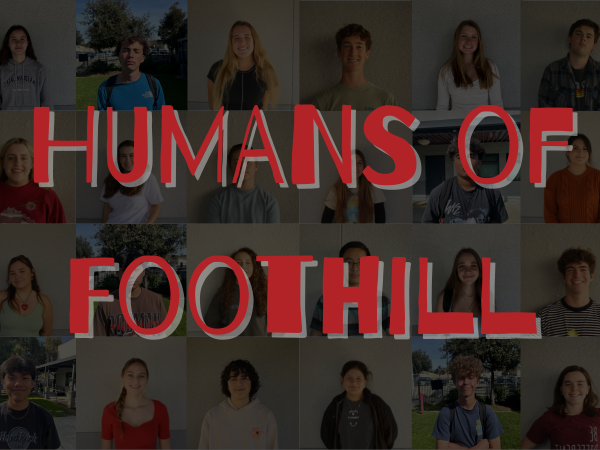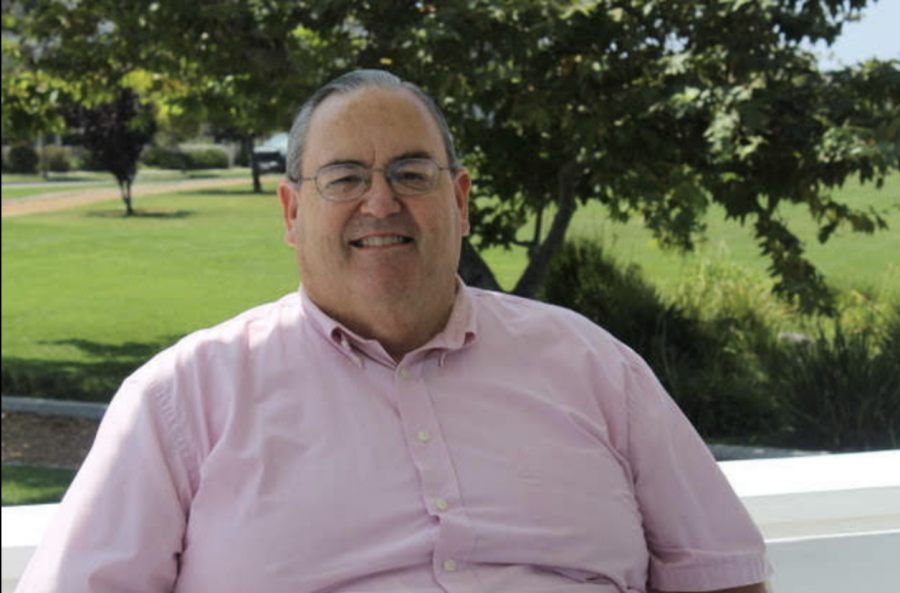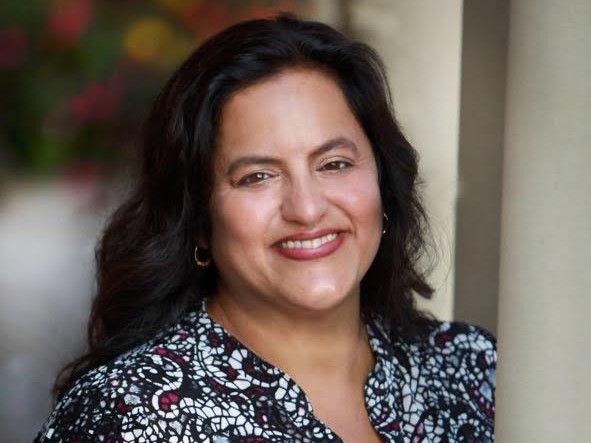Interviewer: What’s your background as a Venturan?
Dannenberg: As a Venturan?
Interviewer: Yeah.
Dannenberg: 32 years ago my wife and two children and I moved here from Northern California, we spent five years up in Del Norte County. Prior to that I was born and raised in Escondido, California. I went back there, started my teaching credential career back then, so we’ve been here for 32 years.
My children graduated from Ventura schools. Presently I have five grandchildren and four of them are still in Ventura schools and one is now at the university. So, my kids, my grandkids look like they’re all going to graduate from Ventura schools which is good because it’s a good school system.
Interviewer: And so then at the end of your term if you are elected, how would we be using, we being students, how would we be using technology differently than we are now and like what steps would you take to implement these changes
Dannenberg: Well the steps I would take would be that we need to be in the cutting edge with business, what is it that business needs and what is it that business is willing to support. I mean, unfortunately, the cost of technology. I mean it’s outdated by the time we get it in the classroom, and so we got to be working with business at probably more to internships of students, doing internships at actual businesses so they can get their hands on their technology because if we ask them for technology they’re going to give us their old stuff as they put new stuff out and the technology’s changing so fast, like I said it’s outdated the minute we put it in the classroom and it will be outdated very quickly thereafter. So we can’t stay up with the cost, so we have to work with businesses to make sure that our students are having access working with those businesses, doing internships in those businesses in a real-life setting that gives them the opportunity to have this on the job experience so they can know how the business, they’re using their new technologies that are out there.
Interviewer: So in your opinion, what’s your next step to like getting all the high schoolers to pass the common core test, and just, getting into the Common Core curriculum if that makes sense?
Dannenberg: Right, I think that what we have to do is, what the state has done is they’ve created a whole new funding mechanisms for schools, realizing that all students aren’t equal, and so we have to start looking at those students that are having problems and providing more resources, more opportunities for them to learn and grow. That being said, while I’d like to see every student pass all the Common Core, what can we do with those that don’t? Because there are always going to be some that don’t because they don’t have the desire or don’t have the ability to pass it and like I said, I don’t want to stop them from having them tutored, but we need to have some real-life opportunities for them so when they leave high school or leave our system, they can walk out in the world of work and be employable and be able to learn, or earn, a living wage in the city, and unfortunately you know, flipping burgers is not a living wage.
So we have to again, this gets back to working from some partnerships with local businesses, some internships where kids can start and learn from the business and maybe get hired on there as a beginning entry-level job and then work their way up. You know that’s evident with people in the school district, when I was with the school district, I don’t know if you know my background, but I was with the school district for 16 years and when I was at the district office, I worked with a guy who now teaches at adult ed, a guy by the name of Terry Weiser. With Terry, when he started he was in our print shop and he was just running copies off for everybody, but he was really into the new technology and he and I together started the first ancient, ancient technology, that was the first ethernet system at the district office and he’d come to me and call me Uncle Jerry, Uncle Jerry just give a few more bucks this is what I can do with that, and you know, he’d show me what he could do and he worked his way up to where he’s got a high paying job with the Ventura adult ed, highly sought after in his field and it’s been beautiful because, you know, there’s nothing wrong with being a printer, but he wanted more for himself and we gave him the opportunity so he made the most of it and we need to find that for our students. Give them the opportunities and hopefully, they can make the most of it to step up, but we need like I said, again, partnership with our local business to make that happen.
Interviewer: So VUSD (Ventura Unified School District) has a budget of 188 million this year. If you had an additional 10 million dollars, how would you spend it?
Dannenberg: There’s never going to be enough money, so 10 million sounds like a lot of money. It’s really not a lot of money when you look at what the state has done to school districts. The state has obviously given districts more money but they’ve also given us more expense in the form of retirements for all of our employees, so those retirements, we used to pay approximately 7 percent of an employees retirement, and in three years we pay 22 percent of their retirement, that’s millions and millions of dollars, you know, so the questions becomes first of being responsible with the money and trying to make sure we have a balanced budget at all times make sure that we do things for students so we need to start evaluating all of our programs and then come back and look at what it is we need to do.
One of the things we need, if we had extra money, is we need to think about, again, those students that are gonna have a hard time with the Common Core and the test, not the Common Core, the Common Core’s not the problem, it’s the test that goes with it. There’s nothing in the Common Core that you wouldn’t want your kids some day to learn it’s the testing and how much pressure we’re putting on teachers and students to pass that test. So, for me, what we’d want to do is to give them more help or get them into some type of vocational education programs to help be able to earn a living wage in this city and be able to continue to live in this city and not have to move out because they can’t afford to live here.
Interviewer: So what do you think the most pressing issue facing the school system is today?
Dannenberg: The most pressing, well, there’s actually two pressing issues. The first is the academic growth of all students so, you know, we’ve got to do that, but the second is always going to be budget, and like I said, there’s never going to be enough money to do everything that we’d like to do and probably need to do for our students, so we have to be good stewards of the money we have, we have to look at, just because we’ve done something for 20 years do we need to continue doing that? Is it getting us that bang for the buck that we want? And if it’s not, maybe we need to refocus that money.
One of our problems in the school district is we don’t pay our employees even at the average for the county. Our teachers and our other employees earn less than the county average right now, and so every year the school district loses several teachers every year to other school districts because they can make a lot more money going to work in other school districts, and so we need to remedy that problem and then, you know, once we get above that, we can really focus in on some other things. But California is facing its worst teacher, the nation, is facing the worst teacher shortage currently in the next few years, and when that happens those that can compete financially salary wise for our, our employees, then you know, we’ll be able to retain our teachers, but if we can’t we won’t be able to retain quality teachers. Unfortunately, a lot of times you lose some of the good ones, and I don’t mean to say that we’re not keeping a lot of good ones too, we’ve got a lot of great employees, I’m not trying to say anything, but you know, we want them all still.
Interviewer: So it seems a lot of times like the board decisions came from out of the blue because it’s not clear how the board operates. If elected, how would you bridge the gap so that students are more aware of what the school board is doing?
Dannenberg: Well I think one of the things that I would like to is, I would like to go out and get student opinions on things, you know, some of what the board does, in fact, I was just thinking about this the other night, along the lines of student discipline. The board has a very prescribed policy and a very prescribed organization they have to follow by law, I mean it’s not their choice, but they do have some latitude. So I’d be interested in what the students think. Does the punishment fit the crime as far as here’s those students that are being punished or is it something that we could find some other way to help those students and keep them in school or do something else for them? Now I want a safe environment for all kids so some kids you need to do something different with, but some kids, maybe, you know, maybe we don’t. When I worked with the district, I left the district in 2002 and went over to Hueneme school district as the superintendent but before I left the district the district board had decided on a no tolerance policy for knives and if you had a knife you were expelled. Well they had a junior from one of our high schools that had a, what’s called a bosun’s knife, and I don’t know if you know about a bosun’s knife, but a bosun’s knife is a knife used for riggings on a sailboat. He lived on a sailboat in the Harbor and it was a tool for him. He forgot he had it. Now, it had a blade on it, yes, but the thickest part of a bosun’s knife it’s got a big old awl for untying knots. But you know, they expelled him, and the kid had no discipline record. It didn’t make any sense to me that, yes, maybe he need some form or discipline but to kick him out of school for a year and send him to some other school, a continuation school or a county school, to me the punishment didn’t fit the crime.
So, you know, I think we really need to use that, and I think we need to ask students what they think, and the other thing that happens right now, if you attend a board meeting when we have student representatives, after the student reps have given their report, the board invites them to leave, and they usually leave, cause it’s kind of boring. Well, I would like the student reps stay and giving their input on some of the decisions the board’s making because they’re going to have some very wise input that we don’t get right now because they get the report of what’s going on at the high school, and then, you know, they’re gone, so you know, they don’t have the legal authority to vote on stuff that the regular board members do, but it’s input that they can get from the students, so that they’re getting a feeling, or just going to pass a new policy, they can say, if they’re a board member to a student rep, so what do you think on this, go back to your school and get some feedback for us of what the other students think about this and at the next meeting, tell us what the kids are thinking. Because I think that’s important, but we lose that right now because we know that a lot of those kids that are at the board meeting are some of the students with the heavier class loads and stuff and so they want to let them go home to study, but I think if possible we ought to encourage them to stay and we ought to ask them for their input. And, on top of that, we have to get out to schools and just ask, you know, come out to talk to the ASB and say, here’s some of the stuff we’re thinking about doing, what are your thoughts on it? Does it make sense to you? Because a lot of what school districts do, don’t make a lot of sense to people that haven’t operated school districts because of the laws that we deal with in running our schools.
In California, California public schools operate off of what’s called a restrictive code which means you can’t do it unless the code says you can do it, and so if you don’t know all those laws, and you don’t know [what you can and can’t do. So sometimes we have parents ask us]* why you doing that, it doesn’t make any sense. Well, it makes sense because the law says we have to do it. An so, I always tell people, if you’re going to tell somebody you can’t do something, and you’re telling them you can’t do it because it’s the law, give them a copy of the law. Say, you know, this is something that the legislature put on us. Don’t blame us because the legislature did it. We’re just following the law the way we’re told it’s supposed to be enacted. And so, I think that’s an important thing to share with the public too, that when we’re making rules, some of those rules we have some discretion on and some of the rules we’re required by law that we make those rules and put them in our policies anåd that.



















